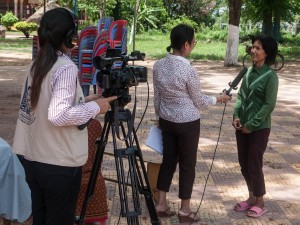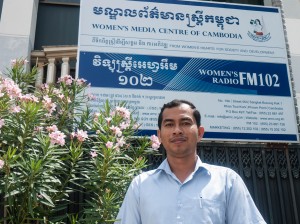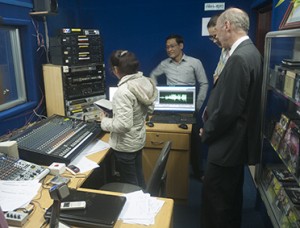A station of their own: women in the media in Cambodia
In Cambodia, gender roles are largely ruled by tradition. Khmer culture says a woman should speak softly, walk lightly, always be well mannered and stay in her home—not exactly the qualities of a good journalist. That might be why relatively few women have entered the field in the past. But one broadcaster, the Women’s Media Centre (WMC), is defying tradition. The non-profit NGO’s radio and television programs address a wide range of issues, with a special focus on the roles and rights of Cambodian women. onMedia’s Kyle James talked with Khut Sokhoeun, WMC’s radio production supervisor—and a man, about working with women journalists in this male-dominated society and how they add to the public conversation.
WMC was founded in the mid-1990s by five women and then launched its own radio station in 1999. You joined six years later. Why did you come to work here?
I always knew that WMC was a unique place. It is one of the leading independent media organizations in Cambodia and there’s no other organization covering issues important to women like we do. That’s why we enjoy the popularity we do. Most broadcasters in Cambodia cover general issues, but women’s voices and perspectives are often absent. Here, we make sure women are heard and their concerns are aired.
What kind of stories does WMC cover?
It’s evolved over the years. At first, a popular issue was domestic violence, which few people talked about back then. Then it was reproductive health. As the society continued to heal from decades of conflict and war, our coverage changed as well. We started looking at legal issues related to women and now we often cover human rights issues that relate to women, since these are big issues in the country. For example, we look at women who are human rights activists, and land grabbing and land conflicts, where women are often on the front lines. These days there seems to be less interest in domestic violence stories, which is good, since it means the situation, while not perfect, has improved.
Around 60 percent of the people working at WMC are women. Does that change the news coverage?
We look at issues that the bigger broadcasters often just ignore. And we let women speak for themselves. Also, female reporters know these issues, since they live them, so I think the coverage can be better in some cases. We also cover more general-interest issues, which men are interested in as well—we have a lot of men who listen to us and watch our videos. But I think women tend to find interesting angles that their male colleagues might not have thought of. Whether it’s from their own experience or ways of looking at problems and issues, I don’t know. But the coverage is different.
Do enough women work in the media in Cambodia?
No. First of all, being a journalist at all in Cambodia is hard. It’s not well paid and journalists don’t have a lot of respect because of the practices of many in the field. Plus, traditional attitudes often keep women from pursuing this kind of career. The old attitude is that Cambodian women are supposed to feed their children, look after their husbands, take care of the home, and not travel very far from it. Journalists have to be out and about a lot, which causes problems for women who want to be reporters, because these old ideas about women are still fairly common.
Is the situation changing?
It’s getting better. Year to year we see the numbers of women in journalism increasing. In general, the role of Cambodian women is changing. In the past, daughters were taught that they didn’t need to learn much in school because they just needed to look after their future husbands, who would provide for them. But recently, more women are getting better educations, their jobs are better and their salaries are rising. They don’t want to get married so early and they’d rather compete with men than take care of them. So society is changing, slowly.
Is it strange for you, as a man, to have women superiors at work given Cambodia’s traditional society?
The WMC by-laws say the executive director has to be a woman, as do the managers of the different media divisions. But I’ve managed to do well here, and I’ve never had a problem having a female boss. Maybe some men might, but I don’t. My own wife works, she’s a finance officer at an NGO. So, maybe we’re a less traditional couple. But really, things have gotten better for Cambodia women and work, even in the media, and that’s a good thing.
The interview was edited for content and clarity.






